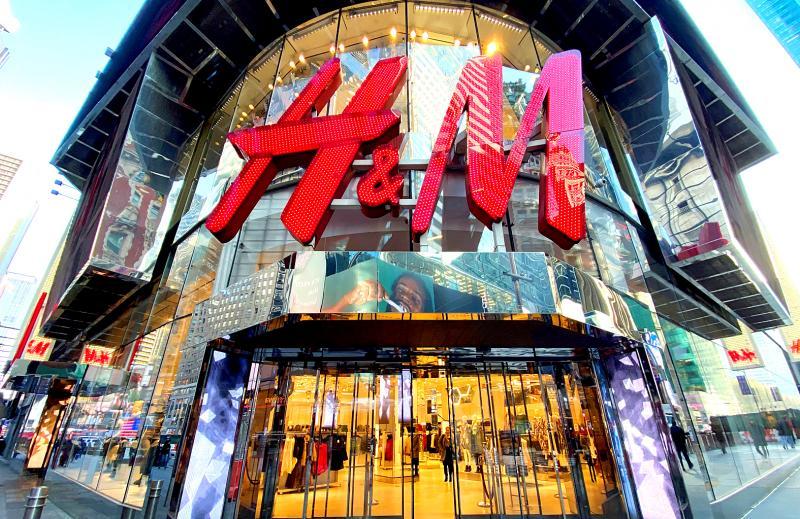Swedish fast-fashion retailer Hennes & Mauritz AB (H&M) is working to buy more of its clothes and accessories from suppliers closer to its key markets in Europe and the US, chief financial officer Adam Karlsson said, in part to prepare for potential US import tariffs.
"For many reasons we need to create a more regionalized supply chain, both for geopolitical reasons, learning through COVID that we need to create more resilience in our supply chain, and also to support responsiveness and the customer offer," Karlsson said in an interview after H&M's quarterly results.
Potential US tariffs on imports are also pushing H&M to seek suppliers closer to its US market, Karlsson said, adding that the retailer had drawn up scenarios for such trade barriers, which he called a "concern."

Photo: Reuters
H&M is exploring options to source more products from Central America, Karlsson said, to serve markets including the US and Brazil. For Europe, it is sourcing more from Turkey and looking to build its supplier base in Morocco and Egypt.
US President Donald Trump has made multiple threats about tariffs including on imports from Mexico, Canada, China and the European Union, and has also floated the idea of a blanket tariff on all imports, which retailers and economists have said would drive prices up.
"If tariffs increase for everyone, there will be a relative position to take (on pricing)," Karlsson said. "We should position our offering in the same way no matter whether there are tariffs or not."
The Swedish clothing giant has not disclosed country-level sales for last year, but in 2023 the US was its second-biggest market by sales, accounting for 14 percent of total revenues.
H&M reported weaker-than-expected fourth-quarter sales yesterday due in part to a late Black Friday, but said sales were up 4 percent last month and this month, indicating a better start to the new fiscal year for the company.
Chief executive officer Daniel Erver, who took over a year ago, said investments in marketing were starting to pay off as its operating profit margin for the fourth quarter to Nov. 30 widened to 7.4 percent from 6.9 percent a year earlier.
"I'm pleased with the early progress, but I believe that there is more potential for us," Erver said in a press conference.
H&M has been struggling to expand its sales as Chinese online retailer Shein attracts cash-strapped shoppers with ultra-low prices and Zara owner Inditex SA has managed to keep selling more clothes at higher prices.
In a push to make H&M trendier, Erver has increased marketing spending and hired pop star Charli XCX to model H&M's autumn collection and to perform at free gigs attended by thousands during London Fashion Week and in New York's Times Square.
H&M's fourth-quarter sales of 62.19 billion Swedish crowns (US$5.65 billion) were up 3 percent in local currencies but below the 63.48 billion expected by analysts polled by LSEG.
Black Friday was on Nov. 29 last year, which meant some revenue was booked in the following quarter, hitting fourth-quarter sales by just under 1 percent.
H&M also took a 200 million crown hit to operating profit due to winding down costs as it folds its Monki brand into Weekday to streamline operations. The move, announced in November, will lead to the closure of most Monki stores.
The group has accelerated its store closures in recent years and focused new store openings on growth markets. It reduced its net store count by 116 last year.

To many, Tatu City on the outskirts of Nairobi looks like a success. The first city entirely built by a private company to be operational in east Africa, with about 25,000 people living and working there, it accounts for about two-thirds of all foreign investment in Kenya. Its low-tax status has attracted more than 100 businesses including Heineken, coffee brand Dormans, and the biggest call-center and cold-chain transport firms in the region. However, to some local politicians, Tatu City has looked more like a target for extortion. A parade of governors have demanded land worth millions of dollars in exchange

Hong Kong authorities ramped up sales of the local dollar as the greenback’s slide threatened the foreign-exchange peg. The Hong Kong Monetary Authority (HKMA) sold a record HK$60.5 billion (US$7.8 billion) of the city’s currency, according to an alert sent on its Bloomberg page yesterday in Asia, after it tested the upper end of its trading band. That added to the HK$56.1 billion of sales versus the greenback since Friday. The rapid intervention signals efforts from the city’s authorities to limit the local currency’s moves within its HK$7.75 to HK$7.85 per US dollar trading band. Heavy sales of the local dollar by

Taiwan Semiconductor Manufacturing Co’s (TSMC, 台積電) revenue jumped 48 percent last month, underscoring how electronics firms scrambled to acquire essential components before global tariffs took effect. The main chipmaker for Apple Inc and Nvidia Corp reported monthly sales of NT$349.6 billion (US$11.6 billion). That compares with the average analysts’ estimate for a 38 percent rise in second-quarter revenue. US President Donald Trump’s trade war is prompting economists to retool GDP forecasts worldwide, casting doubt over the outlook for everything from iPhone demand to computing and datacenter construction. However, TSMC — a barometer for global tech spending given its central role in the

An Indonesian animated movie is smashing regional box office records and could be set for wider success as it prepares to open beyond the Southeast Asian archipelago’s silver screens. Jumbo — a film based on the adventures of main character, Don, a large orphaned Indonesian boy facing bullying at school — last month became the highest-grossing Southeast Asian animated film, raking in more than US$8 million. Released at the end of March to coincide with the Eid holidays after the Islamic fasting month of Ramadan, the movie has hit 8 million ticket sales, the third-highest in Indonesian cinema history, Film